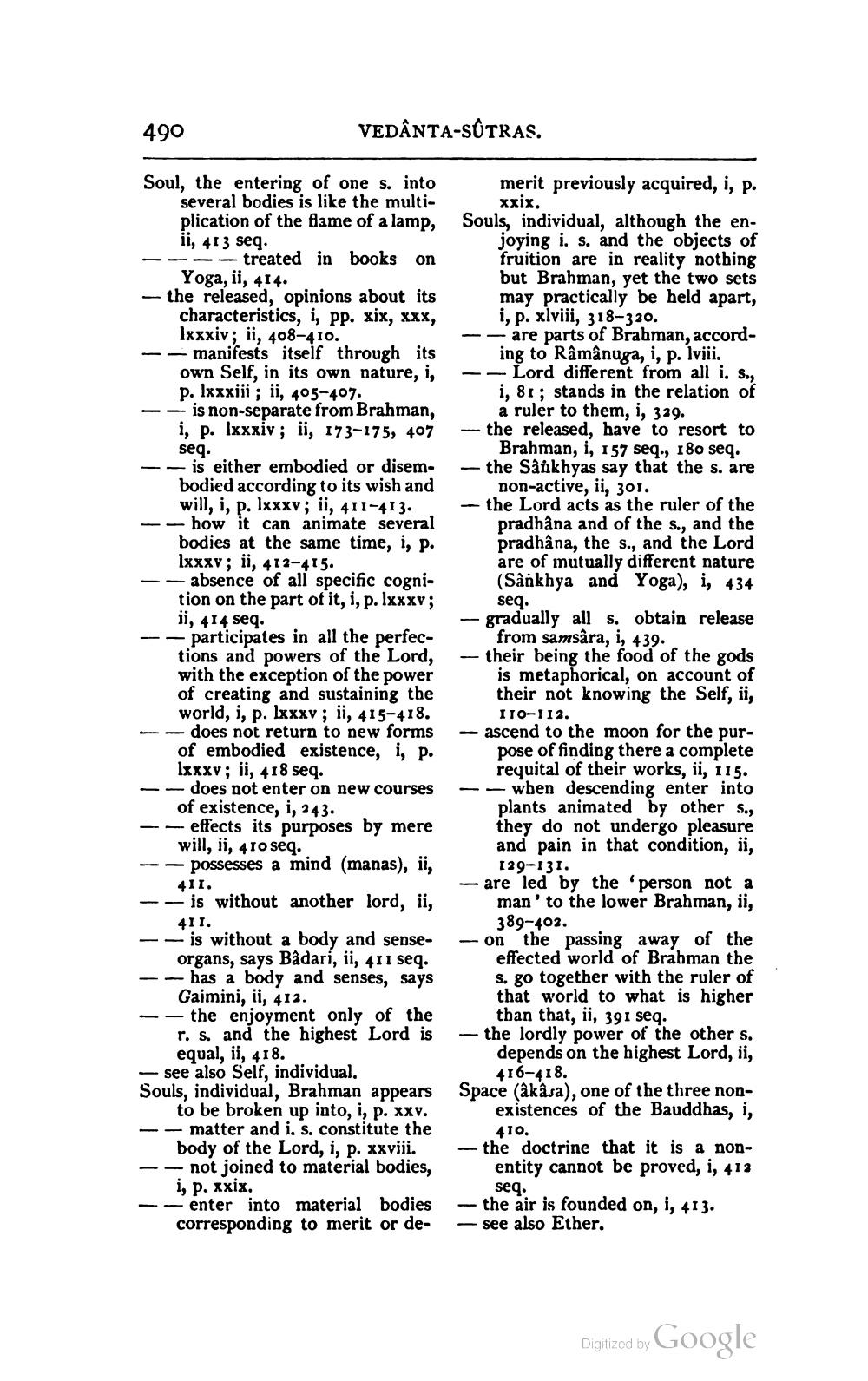________________
490
VEDÂNTA-SOTRAS.
vler stands int from Ivi.
Soul, the entering of one s. into
several bodies is like the multiplication of the flame of a lamp,
ii, 413 seq. ----treated in books on
Yoga, ii, 414. - the released, opinions about its
characteristics, i, pp. xix, xxx,
Ixxxiv; ii, 408-410. - - manifests itself through its
own Self, in its own nature, i, p. Ixxxiii; ii, 405-407. -- is non-separate from Brahman, i, p. lxxxiv; ii, 173-175, 407 seq. - is either embodied or disembodied according to its wish and
will, i, p. Ixxxv; ii, 411-413. -- how it can animate several
bodies at the same time, i, p. lxxxv; ii, 412-415. - absence of all specific cognition on the part of it, i, p. Ixxxv; ii, 414 seq. - participates in all the perfections and powers of the Lord, with the exception of the power of creating and sustaining the world, i, p. lxxxv; ii, 415-418. - does not return to new forms of embodied existence, i, p. lxxxv; ii, 418 seq. - does not enter on new courses
of existence, i, 243. ---- effects its purposes by mere
will, ii, 410 seq. -- possesses a mind (manas), ii,
411. - is without another lord, ii,
merit previously acquired, i, p.
xxix. Souls, individual, although the en
joying i, s, and the objects of fruition are in reality nothing but Brahman, yet the two sets may practically be held apart,
i, p. xlviii, 318-320. -- are parts of Brahman, accord
ing to Râmânuga, i, p. lviii. - Lord different from all i, S., i, 81; stands in the relation of
a ruler to them, i, 329. - the released, have to resort to
Brahman, i, 157 seq., 180 seq. - the Sankhyas say that the s. are
non-active, ii, 301. the Lord acts as the ruler of the
pradhana and of the s., and the pradhana, the s., and the Lord are of mutually different nature (Sankhya and Yoga), i, 434
seq. - gradually all s. obtain release
from samsara, i, 439. -- their being the food of the gods
is metaphorical, on account of their not knowing the Self, ii,
IT0-112. - ascend to the moon for the pur
pose of finding there a complete
requital of their works, ii, 115. - - when descending enter into
plants animated by others., they do not undergo pleasure and pain in that condition, ii,
129-131. - are led by the person not a
man' to the lower Brahman, ii,
389-402. on the passing away of the effected world of Brahman the S. go together with the ruler of that world to what is higher
than that, ii, 391 seq. - the lordly power of the other s.
depends on the highest Lord, ii,
416-418. Space (âkâsa), one of the three non
existences of the Bauddhas, i,
410. - the doctrine that it is a non
entity cannot be proved, i, 413
411,
- is without a body and sense
organs, says Bâdari, ii, 411 seq. -- has a body and senses, says
Gaimini, ii, 412. -- the enjoyment only of the
r. s. and the highest Lord is
equal, ii, 418. - see also Self, individual. Souls, individual, Brahman appears
to be broken up into, i, p. xxv. - matter and i, s. constitute the body of the Lord, i, p. xxviii. - not joined to material bodies, i, p. xxix. - enter into material bodies corresponding to merit or de-
seq.
- the air is founded on, i, 413. - see also Ether.
Digitized by
Digized by Google




